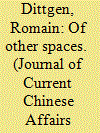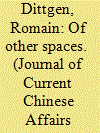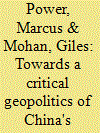| Srl | Item |
| 1 |
ID:
137197


|
|
|
|
|
| Summary/Abstract |
The burgeoning interstate relation between China and Nigeria is in fact hiding the vulnerable condition of transnational Chinese petty entrepreneurship. Small-scale Chinese entrepreneurs in Nigeria are faced with everyday corruption practised by both Nigerian authorities and ordinary Nigerian people, the dominance of self-interest over cohesion and mutual support among the Chinese compatriots, and variations in state policies due to dynamic and changing interstate relations. To overcome their position of weakness, small-scale Chinese entrepreneurs strategize their interactions with both Nigerian and Chinese nationals. Informality is a characteristic of such interactions. Economic informality is primarily embodied in the documentation service businesses that are indebted to those popular corrupt practices in Nigeria; while social informality takes place in cyberspace. Interaction via the Internet among Chinese involved in Chinese–Nigerian businesses helps small-scale Chinese entrepreneurs to cope with fluctuations in interstate links at the macro-level and to develop a sense of community.
|
|
|
|
|
|
|
|
|
|
|
|
|
|
|
|
| 2 |
ID:
137195


|
|
|
|
|
| Summary/Abstract |
Chinese economic activities in Africa have gained increased visibility in parallel to the recent acceleration of Sino-African relations. This paper, which is framed from a geographical perspective that is often absent or neglected in studies covering China–Africa, focuses on the spatial forms and dynamics. It depicts the way in which two contrasting Chinese economic entities – a state-owned company in Chad and privately owned commercial malls in Johannesburg, South Africa – engage with their respective host environments. While drawing on concepts of “liminality” as well as “heterotopias”, I argue that the modalities of the Chinese footprint are characterised both by closure and interaction, creating a dynamic tension that produces its own set of unique practices. This ambivalence between enclave and active linkages with host societies is not only perceivable from a spatial point of view, but also emerges with regard to economic strategies. In the midst of a transitional period, along with a launching and a consolidating phase, the Chinese economic entities in both case studies show signs of change in terms of behaviour and territorial foothold.
|
|
|
|
|
|
|
|
|
|
|
|
|
|
|
|
| 3 |
ID:
137196


|
|
|
|
|
| Summary/Abstract |
Chinese economic activities in Africa have gained increased visibility in parallel to the recent acceleration of Sino-African relations. This paper, which is framed from a geographical perspective that is often absent or neglected in studies covering China–Africa, focuses on the spatial forms and dynamics. It depicts the way in which two contrasting Chinese economic entities – a state-owned company in Chad and privately owned commercial malls in Johannesburg, South Africa – engage with their respective host environments. While drawing on concepts of “liminality” as well as “heterotopias”, I argue that the modalities of the Chinese footprint are characterised both by closure and interaction, creating a dynamic tension that produces its own set of unique practices. This ambivalence between enclave and active linkages with host societies is not only perceivable from a spatial point of view, but also emerges with regard to economic strategies. In the midst of a transitional period, along with a launching and a consolidating phase, the Chinese economic entities in both case studies show signs of change in terms of behaviour and territorial foothold.
|
|
|
|
|
|
|
|
|
|
|
|
|
|
|
|
| 4 |
ID:
099049


|
|
|
|
|
| Publication |
2010.
|
| Summary/Abstract |
China, in its quest for a closer strategic partnership with Africa, has increasingly dynamic economic, political and diplomatic activities on the continent. Chinese leaders and strategists believe that China's historical experience and vision of economic development resonates powerfully with African counterparts and that the long-standing history of friendly political linkages and development co-operation offers a durable foundation for future partnership. Both in China and amongst some Western commentators a form of exceptionalism and generalisation regarding both China and Africa has been emerging. In this article instead we seek to develop theoretical tools for examining China as a geopolitical and geoeconomic actor that is both different and similar to other industrial powers intervening in Africa. This is premised on a political economy approach that ties together material interests with a deconstruction of the discursive or 'extra-economic' ways by which Chinese capitalism internationalises. From there we use this framework to analyse contemporary Chinese engagement in Africa. We examine the changing historical position of Africa within Beijing's foreign policy strategy and China's vision of the evolving international political system, looking in particular at China's bilateral and state-centric approach to working with African 'partners'. Chinese practice is uncomfortable and unfamiliar with the notion of 'development' as an independent policy field of the kind that emerged among Western nations in the course of the 1950s and increasingly China has come to be viewed as a 'rogue creditor' and a threat to the international aid industry. Rather than highlighting one strand of Chinese relations with African states (such as aid or governance) we propose here that it is necessary to critically reflect on the wider geopolitics of China-Africa relations (past and present) in order to understand how China is opening up new 'choices' and altering the playing field for African development for the first time since the neo-liberal turn of the 1980s.
|
|
|
|
|
|
|
|
|
|
|
|
|
|
|
|